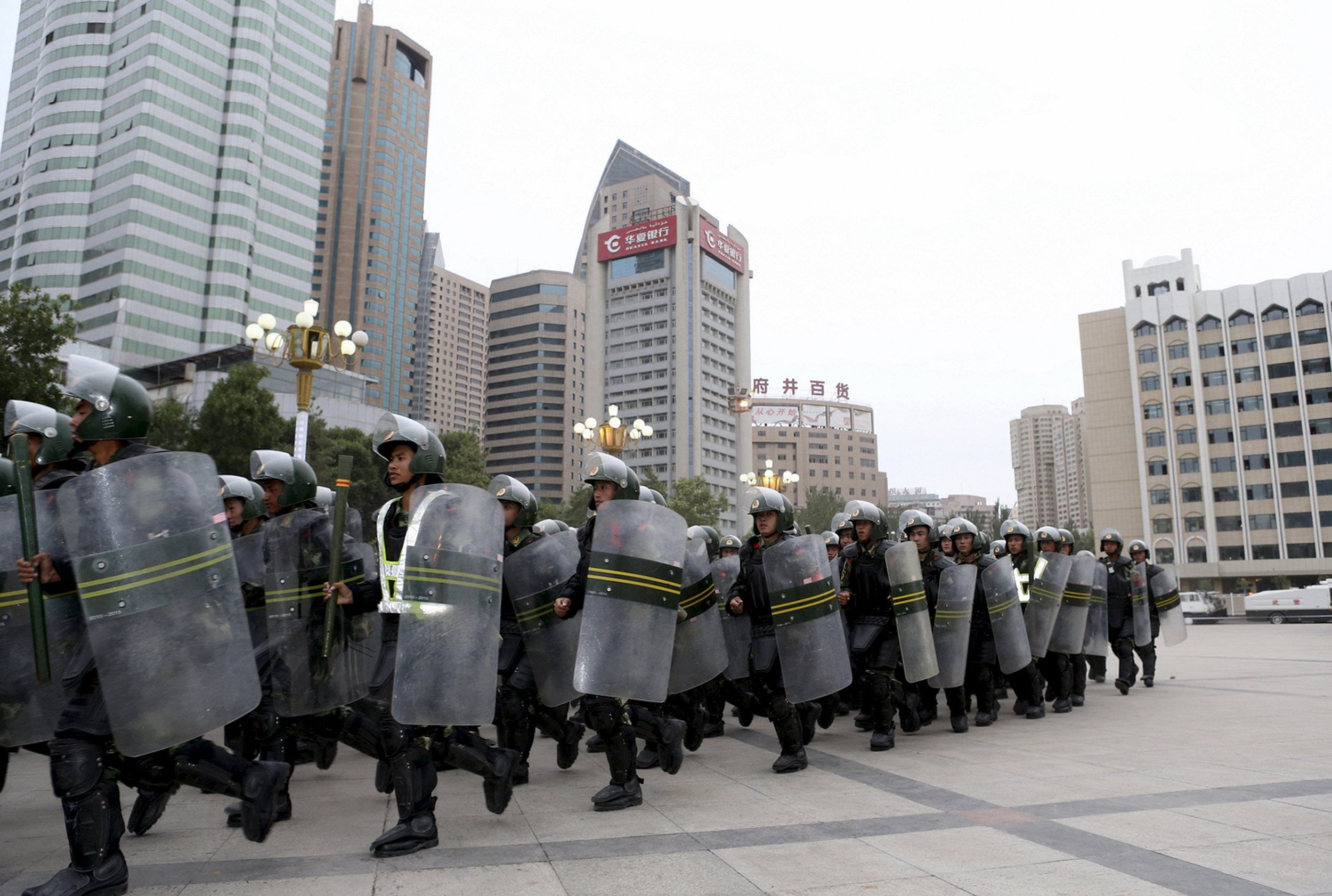BEIJING • When Islamic State in Iraq and Syria (ISIS) leader Abu Bakr al-Baghdadi named China first in a list of targeted countries last year over alleged oppression of Muslim Uighurs in the Xinjiang region, there was hardly any strong reaction from Beijing.
When Chinese national Fan Jinghui, 50, was taken hostage by the terror group in September this year, Beijing launched emergency response mechanisms for his rescue but showed hardly any fury.
When ISIS said on Nov 18 that it had killed Mr Fan, China reacted angrily, with President Xi Jinping condemning the act and the foreign ministry vowing justice against the perpetrators.
Chinese tempers flared again after three Chinese citizens were among 19 killed in an attack on Nov 20 by Al-Qaeda-linked militants in the troubled West African nation of Mali.
China's latest responses have fuelled speculation that it might do more to fight the terror scourge and possibly even join a global coalition against ISIS.
It is clearly not an easy decision but, on paper, there appears to be a stronger case for China now to step up involvement than to remain on the sidelines.

First, China's national pride is at stake if it does little or nothing even after its people are being targeted, a point made by several Chinese observers in commentaries that are allowed to circulate by censors.
Diplomacy think-tank Charhar Institute researcher Wang Chong said the deaths of Chinese nationals in recent terror attacks show that China is targeted as part of the global community and that it can no longer sit by and think it is safe from harm.
"After the killing of Chinese nationals, it is time for China to do something practical," he wrote on Sunday.
Second, ISIS is already hurting China's external economic interests and initiatives and could do more damage if left unchecked.
Dr Zhou Zunyou, head of the China section at Germany's Max Planck Institute for Foreign and International Criminal Law, told The Straits Times that ISIS, being a major source of instability in the Middle East, has affected China's economic interests in that area.
Tsinghua University analyst Zhao Kejin believes ISIS has also affected regional stability in China's neighbourhood, such as Central Asia and even South-east Asia, which is crucial to Beijing's plans to boost economic and trade links with its neighbours through its vision of reviving ancient Silk Road routes.
Writing in a blog last Saturday, he said fighting ISIS will also serve China's domestic interests, as the militant group supports the East Turkestan Islamic Movement, a Muslim Uighur separatist group based in restive Xinjiang fingered by China as supporting violence there. China has also said its nationals from Xinjiang have returned home after being trained in Syria.
Others argue that joining in the anti-ISIS fight is also in sync with China's pledge to proactively take part in global governance, which will boost its aspirations to be a global power.
It may also deepen trust and cooperation between Beijing and Washington, say analysts.
Opponents of a stepped-up Chinese involvement have cited factors, though others say these obstacles could be easily overcome.
For instance, one factor is how being more involved in the ISIS fight could mean the official end of its non-interventionist policy, which is why China has not backed the US-led intervention in Syria.
But some argue that China, through its increased involvement across many regions, has already abandoned the policy.
"The question is when they're going to admit it," counter-terrorism analyst Raffaello Pantucci of the London-based Royal United Services Institute told The Straits Times.
Also, others say the People's Liberation Army (PLA) has no military presence nor combat experience in the Middle East for it to make a meaningful contribution if it were to join the coalition directly.
But University of Macau's Professor Chen Dingding, writing in a paper earlier this year on why China should do more in fighting ISIS, said this supposed shortcoming made it even more important for China to join in the fight.
"By doing so, China can improve its (fighting) capabilities. Given China's deteriorating security environment, a military conflict with others cannot be entirely ruled out. In order to win a war, there is no better preparation than participating in a real war," he added.
Third, some argue that the bigger terror threat China faces is not from the Middle East or ISIS, but from the parts of Central Asia adjoining the Xinjiang region, and that China could become a bigger target for ISIS if it were to step up its involvement.
But commentator Liao Baoping, writing in a blog on Monday, said: "It's better to take the initiative and strike back than do nothing and still get targeted. It is better to draw our sword openly than to be hush-hush about our efforts."
Others also believe there are benefits from ISIS' rise by reducing the US' strategic pressure on China - a line of argument Prof Zhao slams as muddle-headed.
"China doesn't avoid and is unafraid of strategic rivalry with the US. It is a competition benign in nature and steeped in rules. But the struggle against ISIS is different as the group is challenging human civilisation. So China should not have any reservations in the fight against ISIS," he wrote.
Still, most observers say China is unlikely to join the coalition directly - either by bombing the ISIS strongholds or sending troops - due to questions over the PLA's capability and the country's non-interventionist policy.
Instead, Dr Pantucci believes China could play a supporting role to the global coalition in terms of funding and moral backing by agreeing with the anti-ISIS resolutions at the United Nations Security Council.
Dr Zhou believes China may also contribute through sharing of terrorism-related information; cooperation in mutual legal assistance; and border control to prevent Uighur extremists from joining ISIS.
But observers think the key obstacle to China doing more is its displeasure over how the West has dismissed terror attacks on Chinese soil, while being quick to label incidents against Western targets as terror attacks.
It explains why besides expressing condolences over the Paris terror attacks, China also urged Western countries to stop practising double standards in viewing and defining terrorism.
Observers say China's allegations may not be entirely groundless based on the West's response to recent incidents, though Beijing's opaque handling and reporting of terror attacks do raise questions.
Some Chinese observers say removal of double standards is crucial in the building of a global coalition against ISIS, hinting at a pre-condition for China's participation.
"Although this does not imply a reduction in Chinese support for the coalition's efforts in targeting ISIS, foreign reaction to Chinese wishes would weigh as a factor in domestic debates in China," Peking University analyst Zha Daojiong told The Straits Times.
If that is so, both China and the West should take new steps towards that direction to strengthen the terror fight. The West could be fairer towards China in return for its participation, as a potential attack against the world's No. 2 economy could shake global growth. Western nations should give assurances of support in China's fight against domestic terrorism.
For China's part, it could be more transparent and objective. Some find it hard to agree that a disenfranchised individual in Xinjiang suffering genuine oppression by the authorities and then carrying out an attack is a terrorist.
Already, Chinese state media are providing more details in their reporting of recent terror attacks, which will hopefully continue as it will help outsiders form better judgments.
In countering the global terror threat, all countries should agree to only one standard - fight it together - and move in that direction.
For China, doing more may be risky but doing less than necessary could also mean missed opportunities and potentially more damage in the event of attacks targeting the country and its people.
At some point, it is not enough just to show fury.
Actions matter.

